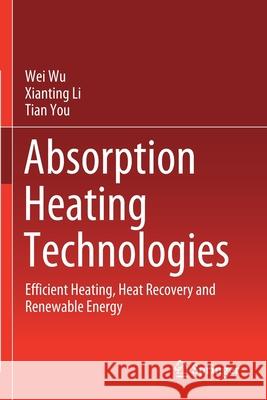Absorption Heating Technologies: Efficient Heating, Heat Recovery and Renewable Energy » książka
topmenu
Absorption Heating Technologies: Efficient Heating, Heat Recovery and Renewable Energy
ISBN-13: 9789811504723 / Angielski / Miękka / 2020 / 266 str.
Absorption Heating Technologies: Efficient Heating, Heat Recovery and Renewable Energy
ISBN-13: 9789811504723 / Angielski / Miękka / 2020 / 266 str.
cena 385,52 zł
(netto: 367,16 VAT: 5%)
Najniższa cena z 30 dni: 382,84 zł
(netto: 367,16 VAT: 5%)
Najniższa cena z 30 dni: 382,84 zł
Termin realizacji zamówienia:
ok. 20 dni roboczych.
ok. 20 dni roboczych.
Darmowa dostawa!
This book offers a comprehensive introduction to novel absorption heating technologies for improving the energy efficiency of heating systems. The proposed low-temperature heating systems, based on an air source absorption heat pump (ASAHP), significantly increase heating efficiency and reduce pollution emissions. As the performance of ASAHPs deteriorates at lower ambient/driving temperatures, a series of advanced cycles is used to extend their applicability, with the compression-assisted ASAHP being the most outstanding example. The book discusses the generator-absorber-heat-exchange ASAHP as a promising solution to make the best of high driving temperatures, an aspect that can be improved further via compression. Further, it addresses the ground source absorption heat pump (GSAHP), which eliminates the soil thermal imbalance of the conventional ground source electrical heat pump (GSEHP), and also reduces the number of boreholes . Various hybrid GSAHP systems are proposed to further enhance applicability, efficiency, and economy: these include a combined GSAHP and GSEHP system, as well as ASAHP and GSAHP systems that incorporate design optimizations. In closing, the book explores the merits of novel working fluids and highlights recent advances concerning waste heat and renewable energy utilization.











